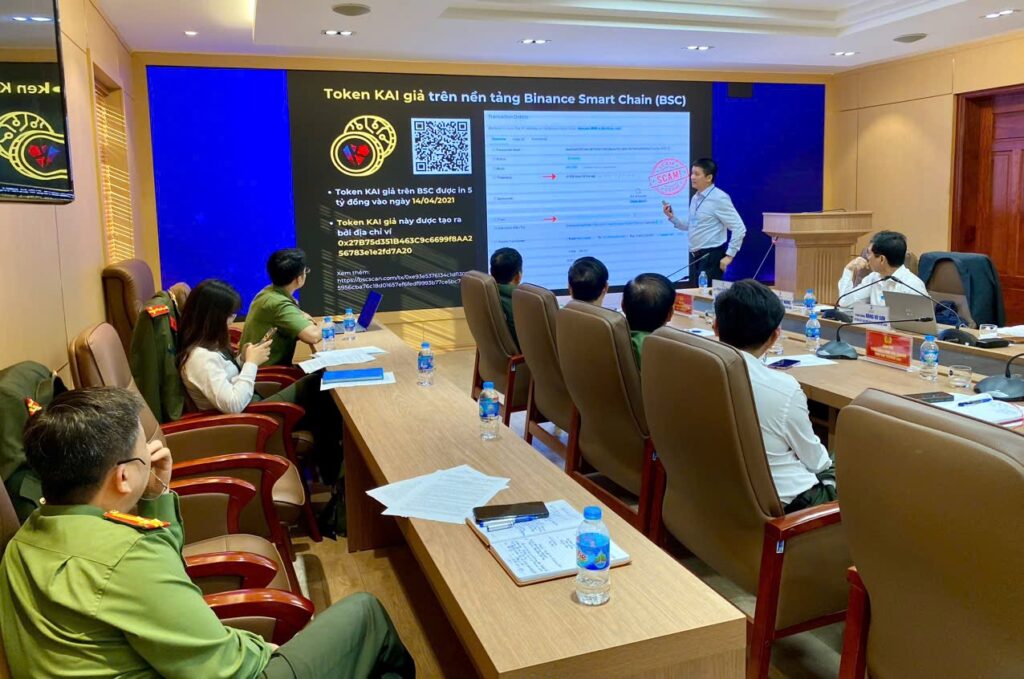Legal compliance is a key factor not only in the Web3 sector but also for any individual or organization operating in any field. With the National Blockchain Strategy, the government has expressed its support for the blockchain industry and its technological applications, such as cryptocurrency assets, fintech products, tokenized real-world assets (RWA), and more.
However, this does not mean that individuals and organizations in Web3 can operate freely without permission. On the contrary, the Web3 community needs to proactively comply with regulations at a higher level, contributing to the development of a healthy and sustainable market, as shared by Ms. Nguyễn Vân Hiền, Secretary-General of the Vietnam Blockchain Association, following the event where the Ton Hackathon was temporarily suspended by authorities for not having an event permit.
Strict Legal Compliance for Sustainable Development
According to the National Blockchain Strategy, which was signed by the Prime Minister on October 22, 2024, in Decision 1236/QD-TTg, Vietnam aims to become one of the leading countries in the region and internationally recognized in the blockchain technology sector. In parallel, the National Assembly and lawmakers are actively implementing specific documents to further realize this strategy, including the Digital Technology Industry Law (expected to be issued in May 2025) and other guiding legal documents to gradually build a comprehensive legal framework.
Through the National Blockchain Strategy and concrete actions, the government has expressed its support for the blockchain industry and its technological applications, including cryptocurrency assets, fintech products, tokenized real-world assets (RWA), and more.
However, this does not imply that individuals and organizations are free to operate illegally. On the contrary, as regulations are being adjusted in an open and supportive manner by state authorities, the Web3 community must take proactive steps to comply at a higher level, contributing to the healthy and sustainable development of the market, as emphasized by Ms. Nguyễn Vân Hiền, Secretary-General of the Vietnam Blockchain Association.

According to Ms. Hiền, many Web3 companies and communities are continuously organizing events to introduce their activities, promote their image, hold exhibitions, and host talent search competitions. However, they have not fully complied with the legal regulations in Vietnam, resulting in suspensions by the authorities and negatively affecting the Web3 environment.
For example, from November 22-24, 2024, Ton Global, an entity without legal status in Vietnam, organized a Hackathon (a coding competition within a limited timeframe, typically 48 or 72 hours) in Ho Chi Minh City. The event was halted by the authorities for failing to obtain the necessary event permit. Immediately following this, some opinions suggested that the actions of the authorities went against the government’s stance on supporting the blockchain industry.
“These opinions are incorrect and come from a small group of individuals concerning blockchain activities in general and the Ton Hackathon event in particular. It should be noted that the authorities’ action to stop the Ton Hackathon event was in full compliance with regulations regarding the organization of events and seminars, especially for foreign entities like Ton Hackathon, which does not have a legal entity in Vietnam and has not obtained an event permit,” Ms. Hiền emphasized.
“Individuals, organizations, and the Web3 community need to understand that government authorities maintain an open stance and support the development of blockchain applications, such as digital assets, cryptocurrencies, GameFi, and more. However, specific activities must still comply with current regulations, such as those related to event permits, exhibitions, and the like.”
Building Ethical Guidelines and Standards for a Healthy Digital Asset Community
In reality, Vietnamese users are facing various illegal activities, such as promotional programs for illicit services publicly conducted by some exchanges like BingX, MEXC, Binance, and others. Several entities with unclear information, such as CrossFi, Mineplex, ALEO, have been continuously organizing private seminars, exploiting their image to attract capital from the community.

One notable example of non-compliance with legal regulations is the KardiaChain group, with affiliated entities such as KardiaChain Foundation, Kaitech Holding Ltd, and KardiaChain Blockchain Connection Co., Ltd. The group has been accused of embezzling approximately $71 million (equivalent to 500 million KAI tokens based on the market price on November 25, 2021) from nine individuals and organizations, both domestically and internationally.

Due to the lack of legal binding, exchanges have not taken appropriate actions to protect customer interests when incidents occur. For example, in the case of 100,000 USDT involving a Vietnamese user and the MEXC exchange, when the user requested cooperation to handle a fraud case through the platform, MEXC demanded that the customer sign a Non-Disclosure Agreement (NDA) before continuing to offer assistance. However, to date, the user has still not received any support.
Similarly, the Gate.io exchange refused to cooperate in helping an investor recover 800,000 USDT that was fraudulently transferred to the platform. The victim had previously submitted a support request to the ChainTracer transaction tracing program of the Vietnam Blockchain Association (VBA) for assistance. Gate.io is also one of the exchanges directly warned by the State Securities Commission regarding its legal standing.
According to Mr. Phan Đức Trung, alongside the current legal regulations related to event organization, business operations, and the ongoing development of a comprehensive legal framework for digital assets, the Vietnam Blockchain Association also encourages communities to establish standards and comply with these soft principles.
“If the legal regulations on digital assets help ensure compliance, discipline, and protection of the interests of all parties involved, then the Ethical Guidelines and Community Standards will help reinforce trust and promote the enforcement of legal regulations within the community itself,” said Mr. Phan Đức Trung, Permanent Vice President of the Vietnam Blockchain Association.
According to Mr. Trung, Ethical Guidelines and Community Standards are crucial in any field, but they are especially important in areas that are in a grey zone and lack a fully developed legal framework, such as digital assets. Moreover, given the cross-border nature, 24/7 activity, and rapid liquidity characteristics of digital assets, they are often exploited for various fraudulent activities, asset theft, money laundering, and tax evasion. Therefore, such soft principles, created and developed by the community itself, become even more significant.
Read more related articles:
– Applying Blockchain and AI in police work, enhancing security and order
– Develop Code of Ethics and Healthy Digital Asset Community Standards
